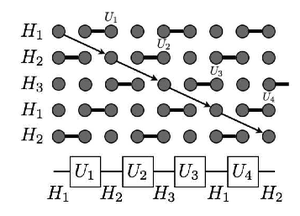Difference between revisions of "Research:Adiabatic Methods For Quantum Computing"
From Quantum Computing Theory Group
| Line 1: | Line 1: | ||
| − | [[Image:agt.png|right|thumb|width=300px|"Talk of dynamic compression and adiabatic gradients didn't carry as much weight as the certainty of its conscious intent." - Thomas Pynchon ''Against the Day'']] | + | [[Image:agt.png|right|thumb|width=300px|"Talk of dynamic compression and adiabatic gradients didn't carry as much weight as the certainty of its conscious intent." - Thomas Pynchon in ''Against the Day'']] |
The word "adiabatic" has an etymology from ancient Greek, meaning, roughly "impassable." In thermodynamics this word was used to denote the condition of not allowing heat into the system. As often happens in etymology, however, the word adiabatic morphed into a new usage with the advent of quantum theory, where it refers to a system staying in a quantum state while properties of the physical system are altered. Thus adiabatic quantum evolutions are explicitly passable, in the sense that there is no obstacle to performing the evolution. Indeed this is the great benefit of adiabatic quantum evolutions: that when doing them the state "stays the same." | The word "adiabatic" has an etymology from ancient Greek, meaning, roughly "impassable." In thermodynamics this word was used to denote the condition of not allowing heat into the system. As often happens in etymology, however, the word adiabatic morphed into a new usage with the advent of quantum theory, where it refers to a system staying in a quantum state while properties of the physical system are altered. Thus adiabatic quantum evolutions are explicitly passable, in the sense that there is no obstacle to performing the evolution. Indeed this is the great benefit of adiabatic quantum evolutions: that when doing them the state "stays the same." | ||
Revision as of 15:39, 17 October 2009
The word "adiabatic" has an etymology from ancient Greek, meaning, roughly "impassable." In thermodynamics this word was used to denote the condition of not allowing heat into the system. As often happens in etymology, however, the word adiabatic morphed into a new usage with the advent of quantum theory, where it refers to a system staying in a quantum state while properties of the physical system are altered. Thus adiabatic quantum evolutions are explicitly passable, in the sense that there is no obstacle to performing the evolution. Indeed this is the great benefit of adiabatic quantum evolutions: that when doing them the state "stays the same."
References
- D. Bacon and S.T. Flammia, Adiabatic Gate Teleportation, Phys. Rev. Lett. 103, 120504 (2009)
